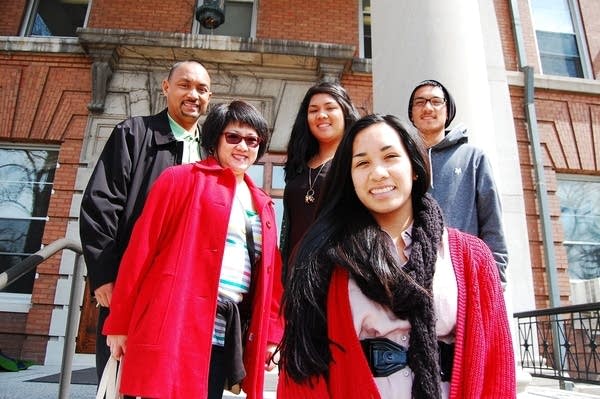Colleges put on full-court press for top high schoolers

Parents of college-bound high school seniors may grow tired of all the phone calls this spring — not from their friends, but from schools hoping to lure them to campus.
Most colleges have a May 1 deadline to obtain commitments from incoming students. To meet them, schools have become more aggressive in their efforts to convince students to pick their campus, through emails, phone calls and face-to-face visits.
Colleges are paying plenty of attention to students like Sam Schwebach, a senior at Minnetonka High School who is undecided.
Schwebach, 18, receives daily emails and phone calls from the four colleges that have accepted him, even though he's narrowed his choices to the University of Wisconsin-Madison and Northwestern University.
Create a More Connected Minnesota
MPR News is your trusted resource for the news you need. With your support, MPR News brings accessible, courageous journalism and authentic conversation to everyone - free of paywalls and barriers. Your gift makes a difference.
For students who've spent years fretting over how to attract the attention of their favorite school, the shoe is now on the other foot.
"Colleges throughout much of the process carry all the power," said Phil Trout, the college counselor at Minnetonka High School. "For one brief shining moment the student carries all the power."
Ten years ago the dance between a college and a potential student was more subdued. The student would mail in an application. The college would mail back an acceptance letter and then wait for the student's reply.
That patient approach is no longer part of college recruitment strategies.
Most colleges will chase undecided students with phone calls and emails. But some colleges, particularly private schools, will go even further to attract students with stellar academic backgrounds or other skills or experiences they think would make them good additions to campus.

Take St. Catherine University in St. Paul. The college flew 17-year old Justine Dejesus from Los Angeles to Minnesota for a campus visit this week.
Dejesus said the college has been sending her a steady stream of emails as she weighs St. Kate's against two colleges in California.
"They're just seeing how I'm doing, wondering when I'm going to come out and visit and see if St. Kate's would be an option for me, if I was planning to go there or not," she said.
Admissions officials at St. Catherine University say the best way to win a student over is to invite her to campus to get a feel for the place.
College recruiters are increasingly aggressive because they know that kind of tactic influences prospective students, said Barmak Nassirian, associate executive director of the American Association of Collegiate Registrars and Admissions Officers.
There also is more competition among schools for top students, he said.
That's happening for a couple of reasons. Because it's easy to apply online, students are often applying to five or more colleges. Also, the rising cost of higher education, coupled with the poor economy, means students and their families hope to compare costs among several colleges before making a decision.
Overall, however, colleges still have the upper hand. The University of Minnesota has received more than 39,000 applications for only 5,300 spots its upcoming fall freshman class. That's a new record and 20,000 more than seven years ago.
Although university officials have had to turn down many students, high achievers are in demand, said Wayne Sigler, director of admissions for the university's Twin Cities campus.
So far, university officials have sent acceptance letters to 18,000 students. Only about 30 percent of those students will accept the offer by the May 1 deadline.
"These are very strong students," Sigler said. "They have lots of alternatives."
Sigler said the increasing number of applications, and increasing number of choices for students, is making it harder for his department to determine how many students will actually show up on campus in the fall.
